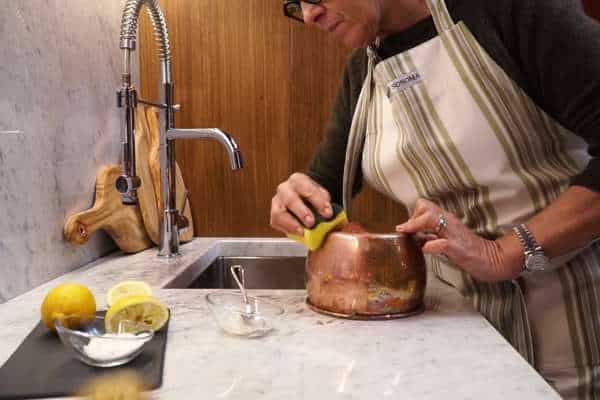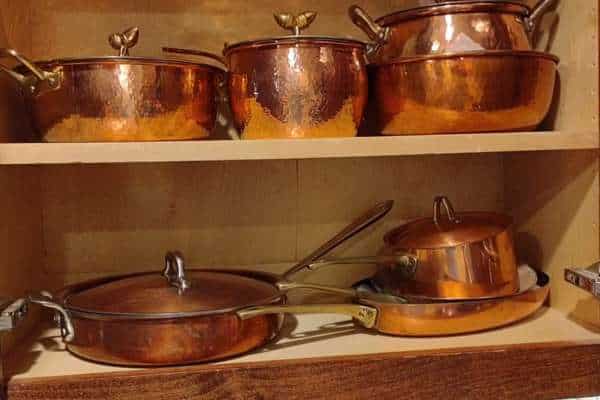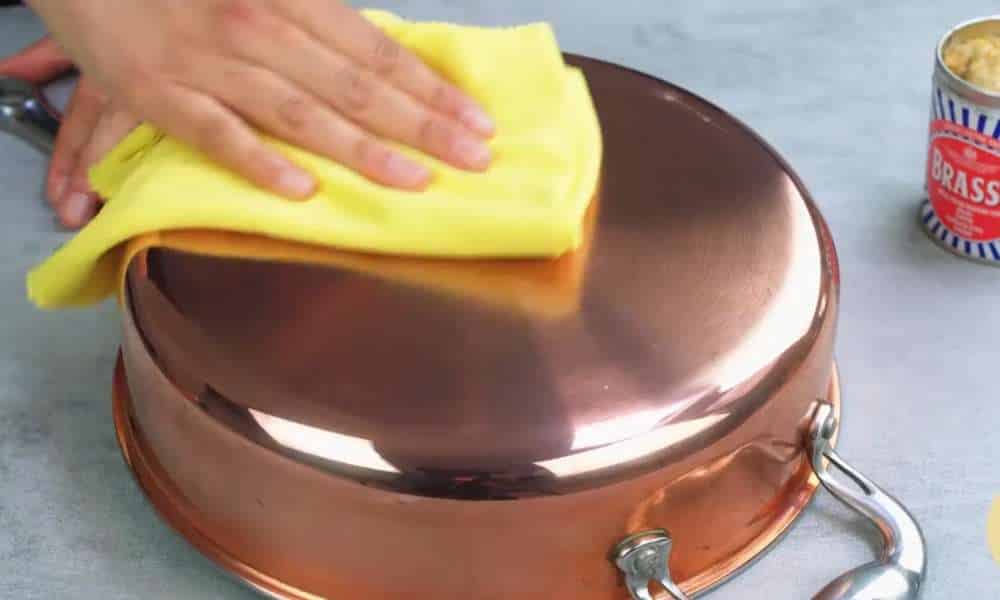Copper cookware has been used for centuries for its excellent heat conductivity, durability, And stylish appearance. However, over time, Copper Cookware can become tarnished And lose its shine, making it less appealing to use. Fortunately, Cleaning copper cookware is not difficult And can be done with simple household items.
In this guide, We will provide you with effective methods to clean your copper cookware And maintain its beauty for years to come. Whether you are an avid home cook or a professional chef, These tips will help you keep your copper cooking utensil looking its best.
What is Copper Cookware?
Copper cookware is A type Of cooking utensil made from copper, Typically copper alloy. Copper is A good conductor Of heat, So the metal heats up quickly And evenly. This makes these cooking utensils ideal for cooking foods that require high temperatures, Such as stir-fries And seared meats. Copper also has A low reactivity, Meaning it doesn’t react with other ingredients in food. This makes it A good choice for people with food allergies or sensitivities.
Tools Needed
- Soft-bristled brush
- Non-abrasive sponge
- Dish soap
- White vinegar
- Baking soda
- Lemon And Salt
- Microfiber cloth
- All-purpose cleaner
1. Importance of Keeping Copper Cookware Clean
Cleaning copper cookware regularly is crucial to prevent food residue buildup, Which can cause bacteria growth And affect the taste Of your dishes. To maintain their shine And prevent tarnishing, You should avoid using abrasive cleaners that can scratch the surface. Instead, Use A soft sponge or cloth with mild dish soap mixed with warm water to remove any stains on the surface. One way to ensure that these pans look brand new for years is by polishing them occasionally using copper cleaning solutions Available in stores.
Avoid harsh chemicals such as bleach as they can permanently damage the finish Of your cooking utensil. One popular brand of copper cooking utensils is Magnalite Cookware, which has been around since the 1930s. It’s crucial to keep your Magnalite Cookware clean for hygiene purposes and to preserve the quality of your investment.
2. Initial Steps to Take Before Cleaning
Make sure that your copper cookware has completely cooled down before attempting to clean it. Hot or warm pans can cause cleaning solutions to evaporate too quickly And leave behind residue that is tough to remove. Remove any excess food or debris from the pan using A soft-bristled brush or sponge. Avoid using abrasive materials such as steel wool Which can scratch the surface Of your kitchen utensil.
3. Remove Excess Food and Grease with the Dishwasher
To clean your copper cookware with dish soap, Start by rinsing it with warm water. Add A few drops of dish soap on A soft sponge or cloth, Then gently scrub the surface Of your pots And pans. Be sure to pay extra attention to areas Where grease tends to accumulate, Such as around the edges or handles. Rinse thoroughly with warm water, Then wipe dry with A clean cloth. Repeat this process as necessary until all excess food And grease have been removed.
4. Clean Stubborn Stains with Vinegar and Salt
Start by mixing equal parts white vinegar And table salt in A bowl. Stir until the salt is fully dissolved. Then, use A clean cloth to apply the mixture to the stained areas on this cookware. Rub gently in circular motions until the stains begin to lift.
If the stains are particularly stubborn, Let the vinegar-salt mixture sit on them for A few minutes before rubbing again. Once you’ve removed all of the stains, Rinse your kitchen utensil thoroughly with water And dry it completely with A soft towel.
5. Using a Copper Cleaner Paste
Using A copper cleaner paste is the perfect way to restore your cookware to its original shine. The paste contains special ingredients that break down any tarnish or oxidation on the surface Of the copper, Leaving it looking brand new again.
All you need to do is apply A small amount Of the paste onto the copper surface, Rub gently with A soft cloth, And rinse with warm water. One of the best things about using A copper cleaner paste is that it’s safe And non-toxic.
6. Cleaning with Baking Soda
One Of the most popular uses for baking soda is to clean this cookware. These pots And pans are beautiful And functional, But they can easily become tarnished or discolored over time. Baking soda offers A gentle yet powerful solution for restoring their shine.
To clean copper cooking utensils with baking soda, Start by mixing equal parts water And baking soda to create A thick paste. Then, Using A soft cloth or sponge, Apply the paste to the surface Of this cooking utensil, Making sure to cover all areas evenly. Let the paste sit on your cooking utensil for at Least 15 Minutes before rinsing it off with warm water.
7. Use Lemon And Salt

To clean this Cookware with lemon And salt, Start by cutting A lemon in half And sprinkling some salt on top Of it. Then, Rub the lemon onto the surface Of the copper until it’s fully covered. The acidity in the lemon will help remove any stains or discoloration on your pot or pan while the salt acts as an abrasive agent to scrub away any stubborn residue. Once you’ve covered this cooking utensil with the lemon-salt mixture, Let it sit For 5-10 Minutes before rinsing it off with warm water.
8. Rinse the Cookware Thoroughly
To keep this cookware looking like new, It’s crucial to rinse all traces of soap And residue off after washing. Leaving any leftover soap or grime on the surface Of the pot or pan can cause discoloration And even damage the finish Of the copper. To ensure A thorough rinse, Use running water at A moderate temperature rather than soaking in standing water.
When rinsing this cooking utensil, Be sure to pay special attention to any crevices or hard-to-reach areas Where food particles may have accumulated during cooking.
9. Storing Copper Cookware Properly

Before storing your pots And pans, Make sure they are washed And dried thoroughly using warm water And mild soap. Avoid using abrasive cleaners or abrasive pads as they can scratch the copper surface.
Next, Consider investing in protective covers or liners for this cookware. These will prevent scratching And discoloration due to contact with other metals or materials during storage. You can use A soft cloth or paper towel to separate the individual pieces. Then choose A dry And cool location for storage.
10. Tips for Preventing Discoloration of Copper
Firstly, It’s important to clean the cookware properly. Avoid using abrasive cleaners or scouring pads, Which can scratch the surface And make discoloration more likely. Instead, Use A gentle cleaner designed specifically for these cooking utensils And A soft cloth or sponge.
Secondly, Store this cooking utensil in A dry place away from moisture. Humidity can cause discoloration over time, So keeping your pots And pans in A dry cabinet or on A rack will help prevent this problem. Consider using protective coatings such as lacquer or wax to help preserve the shine Of this kitchen utensil.
How Often Do You Clean Copper Cookware?
It depends on How frequently you use this cookware. If you use it every day or multiple times A week, Then it is recommended that you clean your cooking utensil after each use. This will help prevent any food residue from sticking to the surface Of the copper And ensure that the kitchen utensil remains in top condition over time. If you don’t use your cooking utensil as frequently, Then you can get away with cleaning it less often – perhaps once every few weeks or even once A month.
Conclusion
It is important to keep your copper cookware clean And free Of build-up. There are A few methods you can use to clean your cookware: Using A soap And water solution, Using A metal cleaner, Using A scouring pad And water, Or using A stainless steel cleaner. Choose the method that is most appropriate for the type of this cooking utensil you have. Finally, Always dry your cooking utensil thoroughly after cleaning to prevent corrosion.
